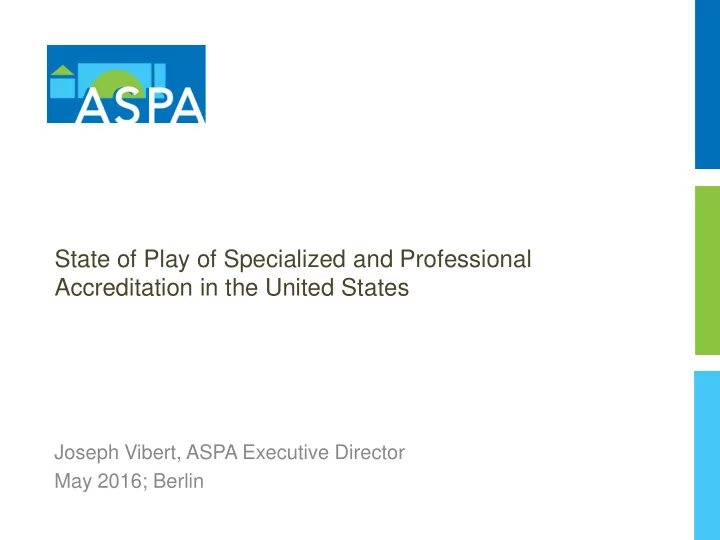

State of Play of Specialized and Professional Accreditation in the United States Joseph Vibert, ASPA Executive Director May 2016; Berlin
Accreditation Environment • Recognition • Council for Higher Education Accreditation (CHEA) • US Education Department (ED)/ Congress/ Administration • States • Institutional Accreditors – Regional, National • Specialized and Professional Accreditors Association of Specialized and Professional Accreditors Page 2
Regulation of Higher Education Federal Government States • HEA funding programs and non-HEA authorization of institutions • “links” for recognition licensure, certification of • Regulations professions • Guidelines/subregulation Triad Council for Higher Education Accreditation Voluntary non-federal Congress recognition • statutes Accreditors • politics Quality, continuous improvement • Institutional Administration Regional National • Programmatic (specialized, professional) Association of Specialized and Professional Accreditors 3
Current Issues • Reauthorization of the Higher Education Act - overdue • high cost of higher education; poor access; low completion • bad players – more, new regulations • Gainful employment regulations • Teacher preparation regulations • Innovation - delivery methods • Distance education • Competency-based education and prior learning assessment • “extra - institutional” providers • calls for • improved system of accreditation – accountability • alternative pathways – risk-based approach • alternative accreditors – current system creates barriers Association of Specialized and Professional Accreditors Page 4
Accountability • What are accreditors doing to protect students? • How can bad players be accredited up until they go out of business? • (ACICS/Corinthian) • Why aren’t accreditors looking more at outcomes and setting outcome benchmarks? • Transparency agendas • ED/NACIQI and CHEA calling for more information to be made public Association of Specialized and Professional Accreditors Page 5
Specialized and Professional Accreditation • Public and lawmaker perception that all accreditors are the same • Membership organizations (old boys club) • Accreditors do not hold institutions accountable for acceptable outcomes. • Institutions rarely lose accreditation • Programmatic accreditors look at outcomes • 100% of ASPA members – accreditor or program determined or combination • 93% have competency requirements – entry-to- practice • 52% set benchmarks (licensed fields) Association of Specialized and Professional Accreditors Page 6
Questions Association of Specialized and Professional Accreditors Page 7
Recommend
More recommend